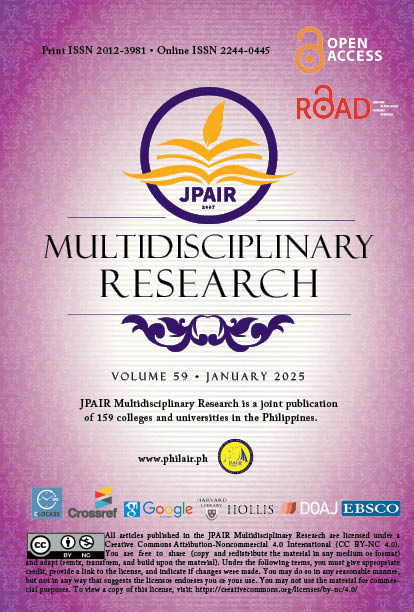An Assessment of Multi-dimensional Factors Influencing Patronage of E-Commerce Channels in Beijing, China: Inputs for Loyalty Program
DOI:
https://doi.org/10.7719/jpair.v59i1.918Keywords:
Business and Management, assessment, factors, patronage, e-commerce, channel, quantitative-descriptive, ChinaAbstract
Cognizant of the growing Chinese e-commerce as one of the fundamental elements of the modern world because of technological advancements, this empirical study investigated e-businesses that utilize a variety of digital channels, such as social media, websites, and specialized applications, to market their products. Through a quantitative-descriptive research method, this study assessed the factors influencing e-commerce patronage, including product type, product quality, pricing competitiveness, user experience, and information security. The respondents were 300 customers of Tiktok, TaoBao, and JingDong in Beijing, China, chosen through quota sampling, who completed a survey questionnaire as the primary instrument for gathering data to answer research problems and test the hypothesis. The results revealed that user experience is highly influential in e-commerce patronage. The impact of these elements on patronage may vary depending on user preferences, platform design, and the overall shopping journey. The availability of a wide range of products on e-commerce platforms attracts customers looking for diverse options, influencing their patronage decisions. Competitive pricing strategies, including discounts, promotions, and price comparisons, significantly influence customers' choice of e-commerce channels. Trustworthiness and security of payment methods, data protection, and overall transaction security play a crucial role in attracting and retaining customers. The factors influencing e-commerce patronage are not significantly affected by demographic characteristics such as age, sex, educational attainment, and income.
Downloads
References
Best, J. W., & Kahn, J. V. (2006). Research in Education (10th Editi). Cape Town: Pearson Education Inc.
Bhattacherjee, A. (2001). Understanding information systems continuance: An expectation-confirmation model. MIS quarterly, 351-370.
Dai, W., Arnulf, J. K., Iao, L., Wan, P., & Dai, H. (2019). Like or want? Gender differences in attitudes toward online shopping in China. Psychology & Marketing, 36(4), 354-362.
Downloads
Published
Issue
Section
License
Copyright (c) 2025 Fang Liu

This work is licensed under a Creative Commons Attribution-NonCommercial 4.0 International License.
Open Access. This article published by JPAIR Multidisciplinary Research is licensed under a Creative Commons Attribution-Noncommercial 4.0 International (CC BY-NC 4.0). You are free to share (copy and redistribute the material in any medium or format) and adapt (remix, transform, and build upon the material). Under the following terms, you must give appropriate credit, provide a link to the license, and indicate if changes were made. You may do so in any reasonable manner, but not in any way that suggests the licensor endorses you or your use. You may not use the material for commercial purposes.




















